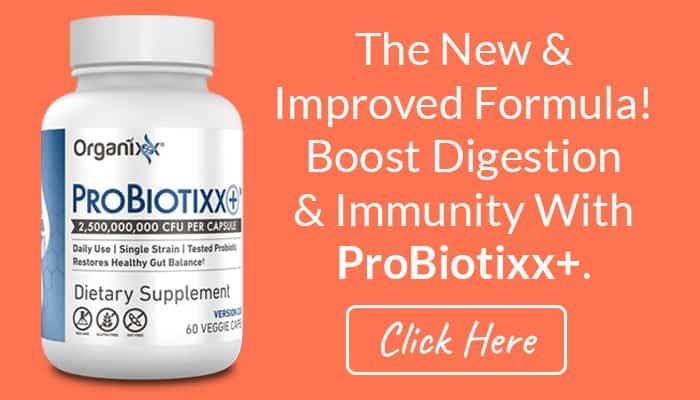Video Transcript:
Today, I want to follow up on allergies and how to combat seasonal allergies in your body. And really, I want to take a deeper dive into the root cause of allergies, seasonal allergies, environmental allergies, and even food allergies all fall into this category.
So, specifically, allergies are caused by a histamine reaction in your body. And histamine is a neurotransmitter. So, this is an interesting process where your brain plays a specific role in the articulation of histamines. And ultimately, histamine is an underlying component in your body’s inflammatory response. You have your immune response and then your inflammatory response that can yield puffiness in the sinuses, puffy eyes, gunk and mucus production in the eyes and nose, coughing, and even in some cases, hives and allergic skin reactions.
Relationship Between Gut Health and Histamine Reactions
Now, if we go deeper into the source of histamine-related responses and the neurotransmitter control of histamine, we need to look at your gut health. So, essentially, there is connection between your body’s allergy response mechanism and the state of your digestive health – your gut health – because your gut health controls a large majority of your neurotransmitters and the signaling and communication pathways from your gut to your brain. I cover this more in-depth in my Gut Health Masterclass, which I’d invite you if you’re looking at going really deep into the inner workings of your gut and the connection to the brain and other body systems, I’d recommend taking that.
But specifically, when we’re looking at gut-related imbalances, we have to look at gut microbes, the actual mechanics of your microbiome. Microbiome, essentially, is a fancy term for the assorted bacteria that is housed in your digestive process. We also have bacteria on our skin and we have bacteria in our oral cavity. Every mucosal membrane has bacteria. And in fact, when we look at our DNA, we’re primarily like 99.9% bacterial DNA and 0.1% human DNA. It sounds shocking, but that’s the way it works, where we are interfacing and have this collaborative effort and relationship that’s symbiotic with bacteria.
Now, when the gut is involved in terms of histamine reactions and allergies, we are needing to address an inflamed and imbalanced gut process, as well as imbalances within your gut microbiome, meaning an imbalance and dysregulation or dysbiosis of your gut microbiome. And so things you do to address the histamine response that’s causing allergies is to make sure you do not neglect healing your digestive process. So, for instance, if you have leaky gut, that can be a big source of allergies, it can be a big source of the histamine reaction in your body.
I happen to work with particular patients that have histamine reactivity, and this falls in the category of POTS and mast cell dysregulation, where the histamine reactivity of the body, the source is coming from a dysbiotic gut, a dysregulated digestive process that ends up becoming systemic in the inflammatory response and the histamine response. This is really common when folks experience hives for seemingly no reason.
So, your allergic response to dust or pollen or grass or mold spores or any type of food that’s causing you to have that histamine reaction, we need to address your digestive process for that deeper healing.
Balance Your Gut Microbiome with Probiotics
So, I’ve talked earlier about some of the topical and more everyday things to calm the symptoms of allergies. But if you want to address the root cause of allergies, you want to address healing your digestive process. And here at Organixx, we have two amazing resources. I am a huge fan of the bacteria type called L. plantarum. This is very powerful and it’s in the ProBiotixx. This is a really good microbiome balancer. There’s a lot of research in this particular strain in helping lower some of the inflammatory response mechanisms and that histamine response that a lot of individuals have. I find a lot of patients find success in taking that particular bacterial strain in a probiotic form.
Restore & Rebuild the Gut with Collagen
And then also for helping heal leaky gut, collagen is extremely powerful as is colostrum therapy. But specifically, collagen can help restore and rebuild the junctures of the small intestines that are loose or leaky that are causing food particles and allergen sources that are triggering histamine in your body, i.e., an allergy-response mechanism. We can heal those junctures by adding collagen into the body.
And I’m very excited because the Clean Sourced Collagens is a very wonderful blend of five different types of collagens. So it’s synergistic in its potency and capacity to help heal leaky gut and tighten up those junctures because what does collagen do? It creates a vertical and horizontal structure to skin and our mucosal membrane and our single-cell lining that’s our small intestine that’s so fragile and so influenced by mucosal imbalances, bacterial imbalances, and internal response mechanism to a virus or to a pathogen or a parasite, collagen can help rebuild that.
So, I hope these two tips help you to take a deep dive into healing your allergies.
Organixx ProBiotixx+ formula contains a single, super-strain of Lactobacillus plantarum, designed to help alleviate constipation… eliminate gas and belly bloat… support your entire immune system… and give you total digestive protection.
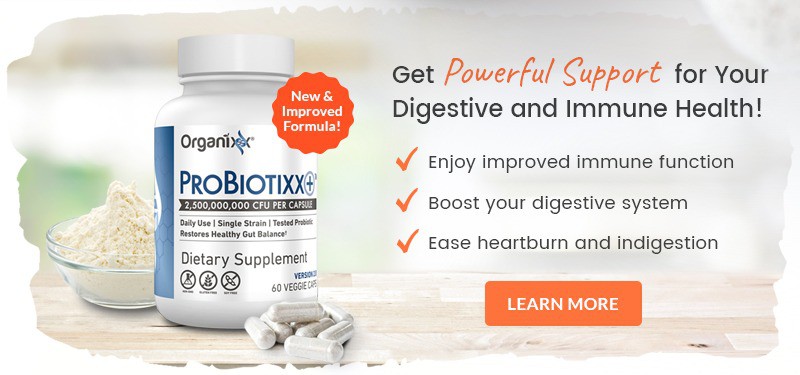
Research into the role probiotics play in health has exploded over the last decade or so. We now know more about
What Are Probiotics Used For?

Before we dive into the specifics about L. plantarum, let’s discuss why probiotics are essential for your health in the first place. Probiotic means “for life.” In a nutshell, probiotics are “good” bacteria you typically consume via food or supplement form. They support life by protecting you from harmful parasites, viruses, and “bad” bacteria that can cause sickness and disease.
Probiotics and Gut Health
Almost everyone has heard that probiotics are good for digestive health. What you may not know, however, is that probiotics are also essential for:
- healthy metabolism
- heart health [1]
- mental health
- immune system health
- balancing hormones [2]
- managing weight [3]
- keeping allergies at bay
- preventing chronic disease
- supporting your liver
- …and so much more!
Remember that your digestive system is home to up to 80% of all your immune cells. The result? You simply cannot survive and feel good without the right amount and the right kind of probiotics. And perhaps the most important type of beneficial bacteria for your overall health is Lactobacillus plantarum.
What Makes Lactobacillus Plantarum Probiotic So Special?
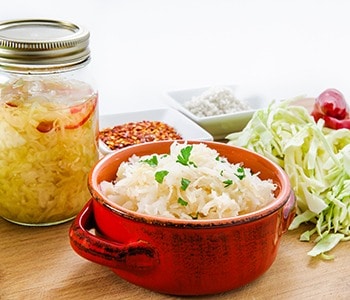
A decade ago we heard very little about the gut microbiome and “good” and “bad” bacteria, but all that has changed.
As mentioned earlier, Lactobacillus plantarum, or L. plantarum, has recently been the focus of much research and is a rising “superstar” amongst probiotics. What’s interesting is that it’s a very common kind of beneficial bacteria found in cultured vegetables.
L.
This barrier prevents pathogenic bacteria such as E. coli from penetrating the lining of your gastrointestinal tract and entering your bloodstream.
L. Plantarum Withstands Antibiotics Better Than L. Casei
The Lactobacillus

One Chinese investigation [4] conducted in 2015 compared the survival rate of Lactobacillus
The researchers discovered that L.
Experts agree that if you need to take antibiotics, an adequate amount of L.
Landmark 2017 Study: L. Plantarum Saves Newborn Lives
People of all ages need a healthy amount of L. plantarum in their digestive tract for overall good health. This is especially true for the very young

Sepsis is a dangerous and life-threatening blood infection that causes major injury to tissues and organs, often resulting in death. According to a World Health Organization (WHO) report (gathering data from the Indian National Neonatal Perinatal Database), sepsis is the most common cause of neonatal death in that country [8].
It is also responsible for 30% to 50% of newborn deaths in all developing countries. While the numbers are smaller, sepsis is a leading cause of neonatal death in the United States as well [9].
A recent study sponsored by the U.S. National Institutes of Health (NIH) in conjunction with the University of Nebraska Medical Center and institutions in India had a very promising outcome. Over 4,000 pregnant women participated in the study that found an L. plantarum probiotic regimen lowered the incidence of sepsis in newborns by up to 40% [10].
Other Positive Benefits for Newborns
The researchers also found that the L. plantarum probiotic regime had other positive side effects for the newborns. In addition to reducing rates of sepsis, these babies also had an 82% lower rate of Gram-positive bacterial infections and a 75% reduction in Gram-negative bacteria. This, in turn, led to healthier babies overall, with 34% fewer cases of pneumonia and other respiratory infections.
The researchers stated in a press release for the NIH that the introduction of the probiotic “may have boosted immunity throughout the entire body, not just in the digestive system [11].”
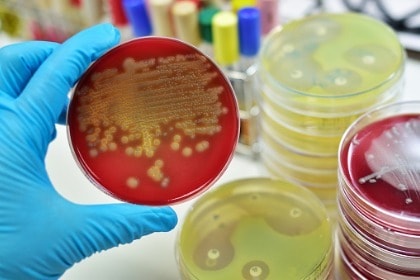
Amongst the common opportunistic Gram-positive bacterium that can create disease states in humans are:
- Streptococcus
- Staphylococcus
- Corynebacterium
- Listeria
- Bacillus
- Clostridium
Gram-negative bacterial infections are difficult to remedy as they tend to be hardier and more resistant to antibiotics [12].
The NIH study is an amazing testament to the power of one simple probiotic and its ability to literally save lives. Because of this, pregnant mothers may be well advised to discuss with their doctors how to ensure sufficient quantities of L. plantarum during pregnancy.
Lactobacillus Plantarum & Digestive Disorders
In addition to its benefits for babies, L. plantarum can be extremely beneficial for those with digestive disorders such as irritable bowel syndrome (IBS), Crohn’s disease, and colitis.

In a Polish clinical trial [13], all participants who were given Lactobacillus plantarum in liquid form experienced less abdominal pain and regulation in stool consistency.
The researchers also alluded to the possibility that L. plantarum may someday become part of regular treatment for IBS.
How L. Plantarum Crowds Out Golden Staph and Other Bad Bacteria
One of the reasons why L. plantarum probiotic is so effective against some of the most aggressive opportunistic bacterium as well as the most common digestive complaints has to do with its unique genetic makeup. We stated earlier that one of the unique characteristics of L. plantarum is its ability to “adhere” to the intestinal wall.
The specific type of adhesion, called “mannose-specific adhesions,” makes it possible for L.
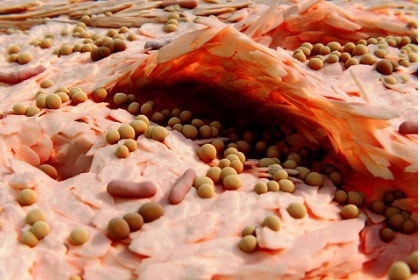
Another unique characteristic of L.
In a February 2019 report published in the journal Microbial Pathogenesis [15], researchers found that anti-microbial properties in both L.
Both of these characteristics and more provide evidence that L. plantarum can be a powerful aide for individuals with specific digestive conditions.
Some research has also discovered that Lactobacillus
Sources of L. Plantarum
Luckily, L. plantarum can be found in many foods. It is a plant-based bacterium (as its name indicates) and appears in abundance in foods such as kimchi, sauerkraut, and cultured vegetables.
Still, some experts estimate that only 25% of Americans [18] have L. plantarum colonies in their system, largely due to eating the standard American diet of processed foods, lots of sugar, and unfiltered tap water.
As a result, one of the simplest ways to ensure that you get enough Lactobacillus
You may have grown up thinking that all bacteria are “bad.” Hopefully, now you know better! Opportunistic bacteria can indeed wreak havoc on your system, and even be life-threatening.
What’s going to help keep these “bad guys” at bay are probiotics. And L. plantarum is turning out to be one of the most powerful of them all. It’s one of the “good guys” that all of us need throughout our lives. Be sure you’re getting enough Lactobacillus plantarum in food or supplement form every day.
Organixx ProBiotixx+ formula contains a single, super-strain of Lactobacillus plantarum, designed to help alleviate constipation… eliminate gas and belly bloat… support your entire immune system… and give you total digestive protection.



